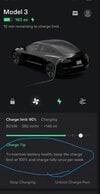So I feel I need to hijack this tread as I'm doing my pre trip dilemma of charging to 100% or not knowing it will be sitting for about 7 hours at 100% ...
The battery has a few Kwh hours of capacity as a buffer right? so realistically charging to 100% should be fine?
I've got a phev that's nearly 10, now I haven't been driving it much due to well the tesla is so cheap to run we use that, however I did a 350 mile trip a few weeks ago and it brought the max stated charge back to an indicated 31 miles (same as when it was new) now I've been doing lots of short trips and basically just driving on the battery range for a while, very seldom the engine kicks in, in doing so the range dropped to 24 miles on a full charge, that big trip was constantly charging a bit and dropping down to as close to 0% as it lets itself before charging it back up, this seems to cause it to do some sort of calibration in my mind and restores it. Now that phev has 8kwh useable out of 11kwh capacity battery, in my mind this extra capacity does 2 things, it prevents damage to the cells at 100% state of charge and it prevents the battery going to a true 0% as there is always a bit kept charged. I'm not sure if this is true or not but in my head makes sense, would this be the same kind of logic for an EV?
So charging to 100% and leaving it for a while, will that kind of help the BMS determine its capacity a bit better? in my mind running it down to close to 0% then doing a 100% charge is going to let the car guess its capacity better? Or am I just thinking its nonsense ?
Every time I try to find a decent answer all I get is opinions never backup with anything. much like my own antidote above.



